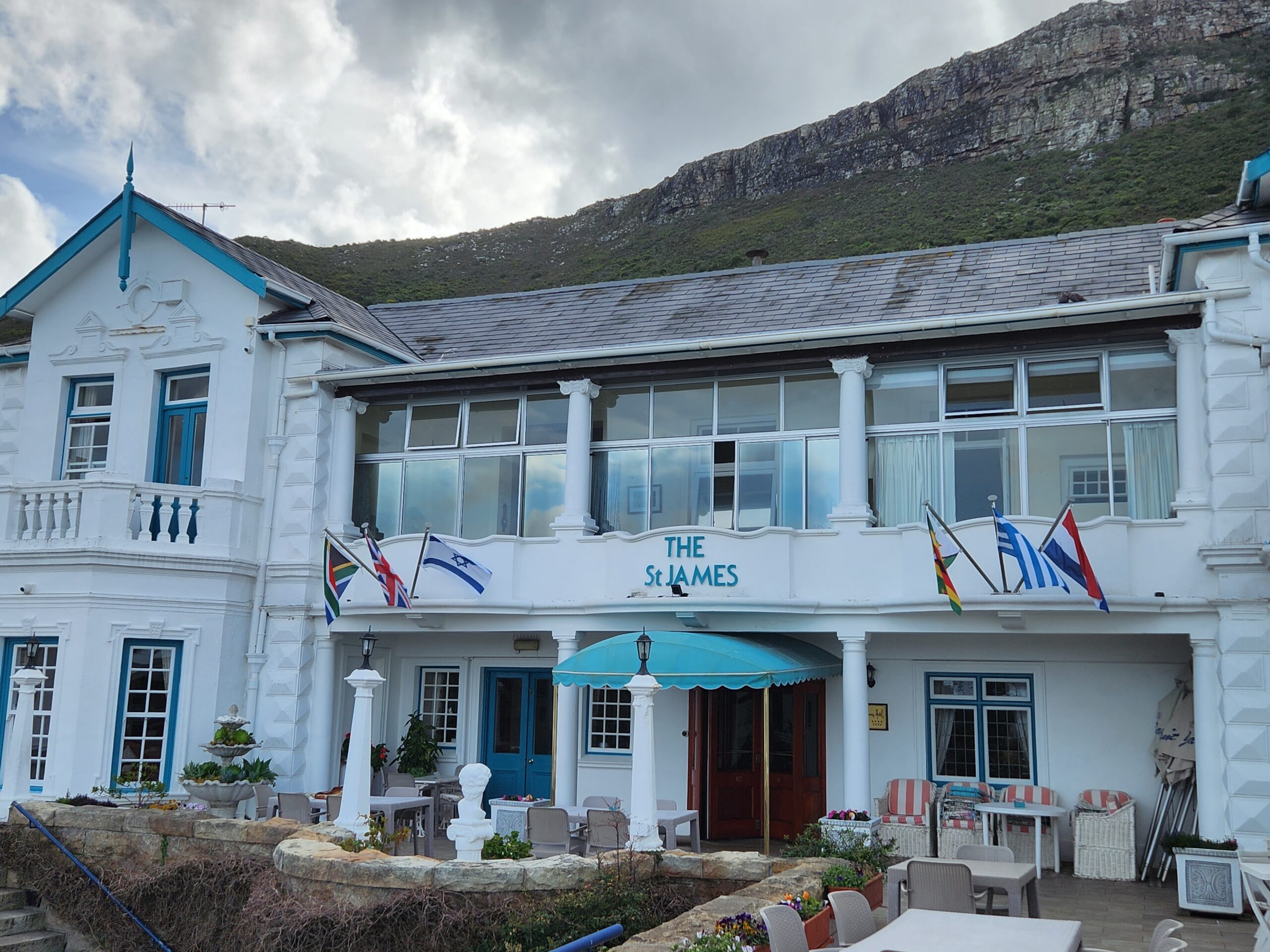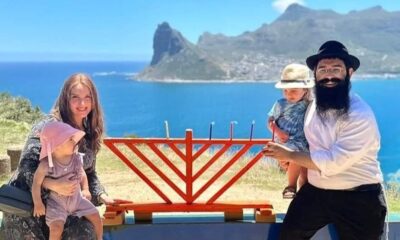
Lifestyle/Community

Israeli flag finds home at Cape retirement hotel
Anyone driving or walking along the Southern Cape Peninsula may do a double take when they notice that the St James Retirement Hotel now proudly flies the Israeli flag outside its entrance door.
Though the home isn’t Jewish, it has five Jewish residents, and this is what motivated the chairperson of the establishment’s board of directors, Thomas Knemeyer, to ensure that the flag of the Jewish state is now part of its display.
“In 2014, I was looking for a nice retirement place for my mom and found the St James Retirement Hotel, which is between Muizenberg and Kalk Bay,” he says. “She was there until November last year, when she passed away aged 95. Two years ago, in the middle of the COVID-19 pandemic, there was a crisis and the residents asked me and others to intervene and join the board.”
Knemeyer did so, and the crisis was averted. The hotel is now full and has a waiting list. “There have always been six flags outside, starting with the Stars and Stripes, because the man who turned the regular hotel in the 1990s into a retirement place was Ronald Getty, the eldest son of the late J. Paul Getty, the US oil magnate,” says Knemeyer. “As long as my mom was there, there was also a German flag. When we recently replaced all the old ones I thought, ‘Hang on, we have a number of Jewish residents who have the right to be Israeli citizens, so let’s put that flag up as well.’”
Though he isn’t Jewish, he has been a fan of Israel for many years. “The turning point for me came in 1972, when as a 15-year-old in Munich, I witnessed the attack from the Black September terrorists on the Israeli Olympic team on TV. Israel also recently celebrated its 75th birthday, so that was also on my mind.”
Given the anti-Israel sentiment of the South African government and of some local extremists, Knemeyer risked a backlash, but “as far as I know, there has been no response from the public, positive or negative”, he says. “If Cape Town Muslims objected, I’d tell them that as soon as anyone from Lebanon moves in, we’ll put up that flag as well! In fact, I’d love to see the Cedar next to the Star of David!”
He thinks that “what the present South African government does vis-à-vis Israel, especially our minister of international relations [Dr Naledi Pandor] is shameful. The ANC [African National Congress] of today has forgotten that in the 1950s, there would have been no armed struggle without Jews. Annmarie Wolpe’s book The Long Way Home was an eye-opener for me. When, in 1988, I came to South Africa as a foreign correspondent for Axel Springer newspapers, I was astounded to see how so few made such a difference to the economy – not just the Oppenheimer’s Anglo and the Menell’s Anglovaal, but also Pam Golding, Raymond Ackerman, Sol Kerzner, Ina Perlman’s Operation Hunger. It’s a long list.
“I sometimes get the feeling these days that they [the government] want to brush all that out of South Africa’s history, like their beloved Soviets once did,” he says.
One of the Jewish residents is Professor Neville Rubin, a lawyer and apartheid struggle activist. His activism began as a student when he was a member and later president of the National Union of South African Students. He was a founder member of the underground African Resistance Movement. He left South Africa in 1963 to pursue his academic career. He was arrested while on a research trip to Mozambique in 1964, but released shortly thereafter and allowed to return to England.
Rubin became a regular broadcaster in BBC programmes dealing with Africa, and wrote and edited extensively on matters of African law and custom. He was a leading figure in the International Defence and Aid Fund, and, as legal adviser, was responsible for devising many of the methods by which funds were secretly transferred to South Africa to support and defend victims of apartheid. In 1976, he joined the International Labour Organisation (ILO), and in the years until his retirement from it in 1995, greatly expanded its involvement in southern Africa. After leaving the ILO, Rubin completed editing the 3 500-page Code of International Labour Law. In 1996, he was appointed an honorary professor of law at the University of Cape Town.
Rubin says he doesn’t have strong feelings about the Israeli flag, but his family has a long connection to the hotel. His father, Leslie, who was also involved in the anti-apartheid struggle, got married there to an heir of the hotel, and also died there. “It wasn’t a retirement home back then,” says Knemeyer. “Former Rhodesian Prime Minister Ian Smith also spent the last years of his life at the St James.”
Another resident, Dr Michael Morris, is a retired medical doctor who fought in the Yom Kippur War in 1973, exactly 50 years ago. “I’m a proud Jew although I’m not terribly religious,” he says. “I’m very proud to see that flag there every day.”











Robert Mancusso
September 21, 2023 at 3:25 pm
I think it’s very nice that the St James Retirement Hotel displays the Israeli flag especially considering that Israel is viewed so negatively by the ANC government as well as the SA Muslim community. I fear that now that this has been brought to the public’s attention in the Jewish Report, there will be objections ultimately leading to the flag’s removal which would be a shame. I hope I’m wrong about that, but time will tell.